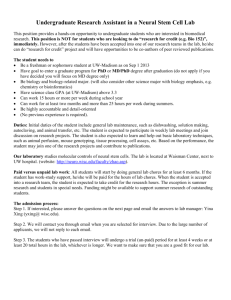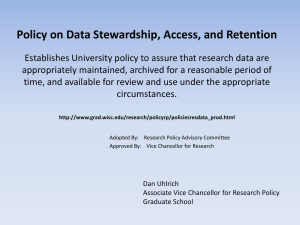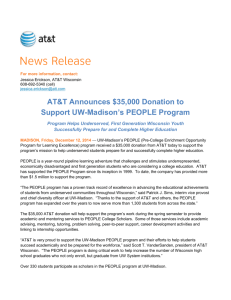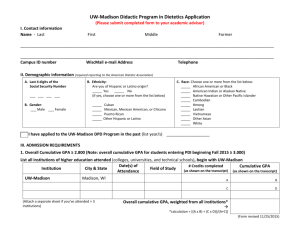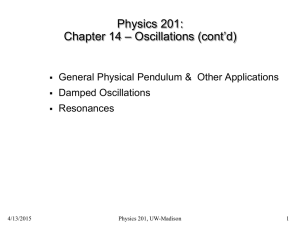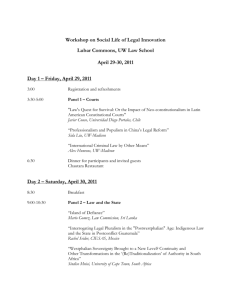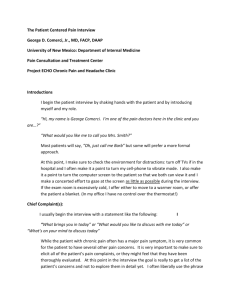Barbara "Barb" Gerloff (1310), Index
advertisement
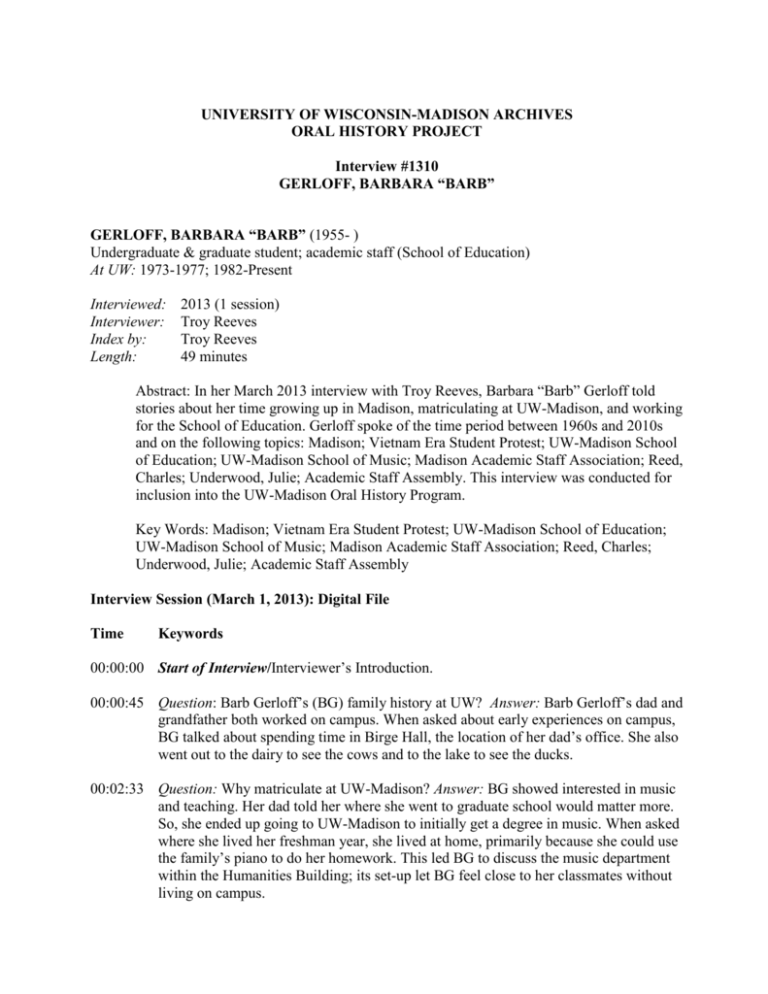
UNIVERSITY OF WISCONSIN-MADISON ARCHIVES ORAL HISTORY PROJECT Interview #1310 GERLOFF, BARBARA “BARB” GERLOFF, BARBARA “BARB” (1955- ) Undergraduate & graduate student; academic staff (School of Education) At UW: 1973-1977; 1982-Present Interviewed: Interviewer: Index by: Length: 2013 (1 session) Troy Reeves Troy Reeves 49 minutes Abstract: In her March 2013 interview with Troy Reeves, Barbara “Barb” Gerloff told stories about her time growing up in Madison, matriculating at UW-Madison, and working for the School of Education. Gerloff spoke of the time period between 1960s and 2010s and on the following topics: Madison; Vietnam Era Student Protest; UW-Madison School of Education; UW-Madison School of Music; Madison Academic Staff Association; Reed, Charles; Underwood, Julie; Academic Staff Assembly. This interview was conducted for inclusion into the UW-Madison Oral History Program. Key Words: Madison; Vietnam Era Student Protest; UW-Madison School of Education; UW-Madison School of Music; Madison Academic Staff Association; Reed, Charles; Underwood, Julie; Academic Staff Assembly Interview Session (March 1, 2013): Digital File Time Keywords 00:00:00 Start of Interview/Interviewer’s Introduction. 00:00:45 Question: Barb Gerloff’s (BG) family history at UW? Answer: Barb Gerloff’s dad and grandfather both worked on campus. When asked about early experiences on campus, BG talked about spending time in Birge Hall, the location of her dad’s office. She also went out to the dairy to see the cows and to the lake to see the ducks. 00:02:33 Question: Why matriculate at UW-Madison? Answer: BG showed interested in music and teaching. Her dad told her where she went to graduate school would matter more. So, she ended up going to UW-Madison to initially get a degree in music. When asked where she lived her freshman year, she lived at home, primarily because she could use the family’s piano to do her homework. This led BG to discuss the music department within the Humanities Building; its set-up let BG feel close to her classmates without living on campus. Barbara “Barb” Gerloff (#1310) 00:05:16 Question: Faculty that BG remembered? Answer: BG listed several members of the music department, specifically the voice faculty. BG sang in the vocal choir for 3 years, including going on tours to sing. When asked about students, BG talked about Barb Kaufman, a friend since high school; both enjoyed music. BG furnished some memories, briefly, about other students, including her roommate at Chadbourne who played the harp and stored it in their room. 00:08:38 Question: Thoughts about the student protest movement of 1960s and 1970s? Answer: BG father’s lab was in Birge Hall, which suffered major damage with the Sterling Hall Bombing. BG recalled going to campus after the bombing and seeing windows without glass, as well as glass within her father’s lab. BG and her father went to big rallies at the Field House and marches up State Street. As a teenager during the protest, she felt “cool” taking the bus to the protests. 00:11:19 Question: Where did BG’s parents live in the 1960s/1970s? Answer: They lived on Whitney Way, near the now beltline. BG was against the war, as was her father, although her father felt the bombing was wrong, too. When asked about protesting while an undergrad, BG recalled being in the Humanities building at a class when someone rushed in, wrote something on the blackboard, and ran out. That event did not rattle her too much. 00:14:30 Question: BG’s future after undergraduate? Answer: BG felt she would teach music in secondary schools for a bit, before getting an advanced degree somewhere. While teaching in Superior, BG lost her job due to cuts. While teaching, BG became interested in administration and found out about higher education administration, which appealed to her. BG discovered academic staff as a way to become involved on campus without a Ph.D. 00:16:55 [No question.] BG came back to Madison to get a degree in educational administration; the School of Music hired her to teach a couple of classes. She taught there for a couple of semesters. BG then earned a job as a program assistant while still a graduate student. She really liked the job, which involved working with college-aged kids. She has worked there in various guises since. She gave a brief overview of her resume; she has worked as graduate student, instructor, or academic staff since 1982. 00:20:05 Question: Academic staff in 1987; when did BG become involved in governance? Answer: BG said “a long time.” She explained why. She started academic staff governance work in the mid-2000s. BG, with prompting from narrator, then gave a brief overview about her work, eventually leading to her current role as an assistant dean. The interviewer then returned to academic staff committee work; BG recalled being asked if she wanted to be involved in Madison Academic Staff Association (MASA). BG talked about Bob Miller, knowing that he worked on academic staff governance issues. 00:22:52 [No question.] BG called herself a half-generation removed from those, such as Char 2 Barbara “Barb” Gerloff (#1310) Tortorice and Anne Wallace, who worked hard to get academic staff governance. She knew them all but knew very little about MASA. When she became a MASA leader, those first generation folks served on the board. BG then listed her involvement in MASA and other campus groups related to academic staff issues. 00:25:26 [No question.] BG served on committees before getting into Academic Staff Assembly, which she said went against how most folks became involved. When asked about key issues related to academic staff since the mid 2000s, BG found it striking that every meeting or conference came back to two issues: first, academic staff diversity (instructional staff, researchers, librarians, academic services, etc.) and the issue of getting a true peer group and being mobile on important issues. 00:29:20 [No question.] The second major issue became issues between researchers and the grant’s PI (principle investigator). Specifically, that academic staff found no avenue for their concerns. BG said it concerned her, particularly because classified staff could point to work rules. Academic staff did not. 00:31:49 Question: BG’s relationship with the School of Education’s Deans? Answer: BG called herself lucky, because of her growing up here, which led to great relationships with most all the Deans she served. [Note: some background noise here.] She listed all the deans and why she felt positive towards most of them. 00:35:23 [No question.] She spoke in a bit of depth about Charles “Chuck” Reed & Julie Underwood. She figured the Deans supported her office for not only their good work but also their proximity to students. She felt she could approach any of the Deans with a question or concern. 00:38:38 Question: What does BG do in education academic services? Answer: BG started with the office’s two main areas: advising students in a wide variety of programs and providing field experiences (student teaching and practicum) for their students. BG’s current work does not provide her with specific students; she has attended meetings to track possible changes within the school’s departments. She also will work with new courses and degree audit. As assistant dean BG will fill in at various parts of the office when needed. 00:42:36 Question: Does BG have less direct contact with students? Answer: Yes, although she still will deal with students, usually when a problem has arisen. She still, however, will get enough interaction with students to energize her. She has enjoyed attending SOAR activities each summer to see the new students and their excitement. 00:44:28 Question: BG’s final thoughts? Answer: BG called UW-Madison a “magical place,” particularly for progressive ideas. Also, she loved the fact she could meet with Deans, ride the bus with faculty, and experience the “kooky” things that happen here. These thoughts led BG to discuss her interaction with incoming students and their parents, particularly how to explain UW-Madison’s difference. It boiled down to UW-Madison do all of their activities with enthusiasm, attention to detail, and perseverance. When 3 Barbara “Barb” Gerloff (#1310) the parent also matriculated here, BG’s comments will spur a story or two from them. In conclusion: UW-Madison has never been a “Whatever” place. 00:48:35 End of Interview End of Oral History #1310 4
